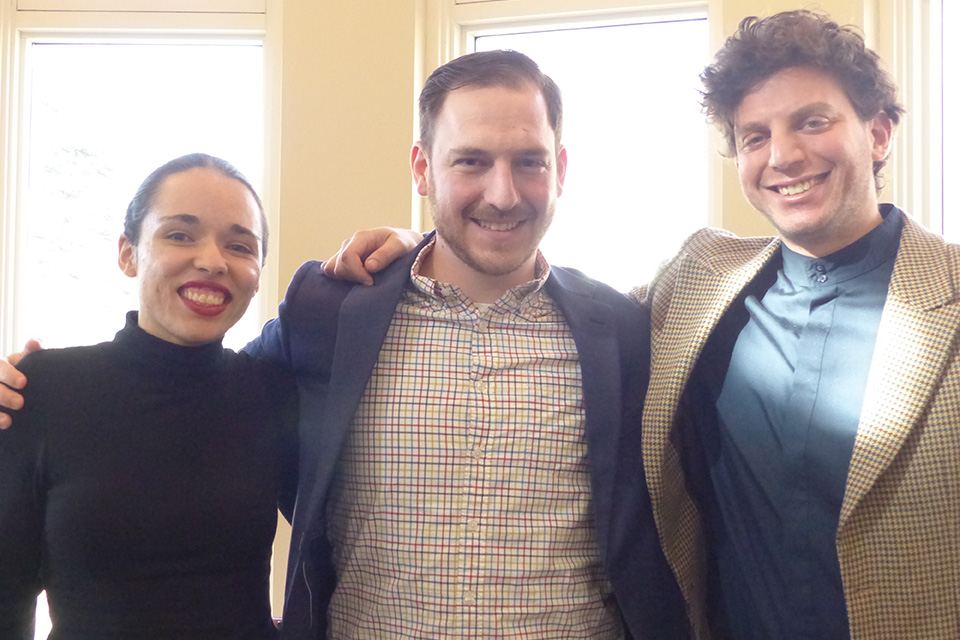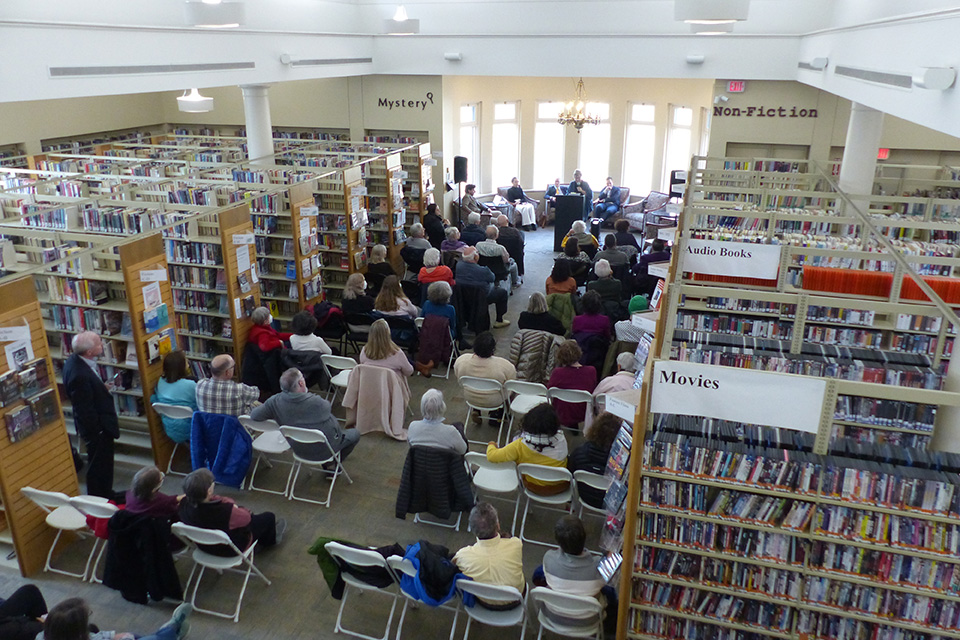Two-Year Wayland Free Public Library Project Culminates in Successful Event

Elizabeth Simms, Joseph Weisberg, and Rafael Abrahams at the Wayland Free Public Library event
Photo Credit: Amy Singer
April 13, 2023
Alyssa Stalsberg Canelli | Graduate School of Arts and Sciences
The two-year collaboration between Wayland Free Public Library (WFPL) and the Brandeis University PhD program in History started with just a phone call in the summer of 2021. Marjanneke Wright (“MJ”), the Bibliographic and Reference Librarian at WFPL, reached out to Professor Amy Singer to learn whether it would be possible to involve one or more graduate students in a project for the library’s 175th anniversary. On March 19, 2023, the results of this exploratory phone call culminated in a community-wide public event with the highest in-person attendance of any WFPL program since the beginning of the COVID pandemic.
In the fall of 2021, Professor Singer submitted an application to The Connected PhD to fund a project titled History of the Wayland Public Library. The Connected PhD’s goal of creating professional and skill-building opportunities to prepare PhD students for diverse career paths aligned very closely with the goals and outcomes of the WFPL collaboration. The two-year collaboration would introduce PhD students to the world of public library archiving and curation and develop their skills in writing public-facing output for a broad audience whose diversities are shaped by age, education, income, gender, race, ties to Wayland, and general interest. With the Connected PhD funding in hand, Professor Singer recruited History PhD students Rafael Abrahams, Elizabeth Simms, and Joseph Weisberg to research and write the WFPL’s history. In addition to the public event, the collaboration is resulting in a book of the combined essays, forthcoming in summer 2023.
The March 19, 2023 event, The History of Wayland Free Public Library’s 175 Years, was a reflection on WFPL’s unique history as a pioneering library and its place in the broader contexts of Massachusetts, New England, and the nation at large. The PhD students gave brief remarks reflecting on their experiences and revealing tidbits about the library’s distinguished and complicated history. In fact, their research undermined Wayland’s claim (memorialized on at least several public plaques) that the WFPL was the first free public library in the United States. The audience took this news with good humor as the presenters explained the nuances of this historical claim, which are dependent upon how one defines “free” “public” and “library” in the eighteenth century. Jane Sciacca, a Wayland resident, also discussed her experience as the de facto town historian. The second half of the event featured a roundtable with the three PhD students, along with UConn Professor Emeritus Dr. Robert Gross, who gave the final remarks.

The crowd enjoys the WFPL event!
Photo Credit: Amy Singer
Professor Singer enthusiastically acknowledges that this collaboration has influenced her own thinking about doctoral training in History in very concrete ways: “I am convinced that work experience as an historian, in some professional environment outside of the classroom and university, is an invaluable part of graduate training…the opportunity to apply immediately the knowledge and skills being acquired in seminars and in writing research papers, amplifies graduate training in meaningful ways. From my perspective as Director of Graduate Studies, I think it works to affirm for the students the professional choice they made to study history; it adds to their self-confidence; and it does not postpone the rewards or proofs of their education until the magical, mythical time of ‘after my dissertation is finished.’”
Echoing this enthusiasm, MJ Wright notes that the response from Wayland residents has been overwhelmingly positive, and that she was pleasantly surprised by how the three PhD students worked together as a team: “I would never have dreamed that a cold call to Professor Amy Singer would end up in such a rich experience for me and for Wayland. I didn't realize how much the library would benefit from having not one, but three students working on this history project. I thought dividing up the work might give a feeling of fragmentation. However, the three students have different strengths that contributed to the whole. Joe's meticulous research, Rafi's focus on personal interaction through spearheading the focus group and library history talk, and Elizabeth's interest in twentieth-century history strengthened the overall project.”
The PhD students were similarly surprised by aspects of their own experiences. Joseph Weisberg explains that he was “shocked by the quality of the materials that the library had maintained. As historians, we are trained to think a lot about archives and learn the practical skills about locating archival materials. Throughout this project, I have spent a lot of time thinking about how small archives at local institutions like the Wayland Free Public Library often slip through the cracks because they are not always integrated into the scholarly tools that we use to locate collections.”
Both Rafael Abrahams and Elizabeth Simms commented on the productive challenges inherent in a community collaboration. Rafael noted that he was “surprised by the necessity of compromise in a collaborative project. In academic history, research projects are typically conducted by a single scholar who is following their own interests and has full control over their final product. The WFPL history project was very different-- while I certainly enjoyed a great deal of freedom of inquiry as a researcher, I was ultimately producing work on behalf of a community bigger than myself, and directly answering to MJ Wright and Andy Moore (the librarians who commissioned the project) who were in turn answering to the WFPL Board of Directors. It was interesting and humbling to learn a little bit about the power dynamics behind a civic institution like the WFPL, not only in the historic past but in the present!”
Elizabeth also assumed that she would be working mostly independently even if not isolation, but she was surprised by the “amount of collaboration involved in this project, and how challenging this collaboration could be…in reality, completing the written pieces required many meetings with the library staff and community members about feedback and ideas, as well as the incorporation of this feedback and these ideas into my work. This collaboration, though, made my work better because it then reflected the perspectives and wants of the community for which the project was created.”
As the supervising faculty member, Professor Singer watched these challenges and compromises unfold, which itself was a valuable professional lesson for the students: “I was also impressed with the way the students navigated some of the pushback about their findings and inclination to write on more controversial, contemporary topics. Any institution has constituencies that it must negotiate with, and moving them to accept or acknowledge more unhappy chapters in an institution's past can be difficult. Certainly, our students never had to do the negotiating, but they had to deal with the disappointment that not all of what was most compelling to them would find equal space in the final publications.”
In terms of their own professional pathways, the students unanimously agreed that this experience was one that would influence their thinking and career trajectories as they complete their degrees. Joseph describes the ways that “this project helped me envision different ways to be a professional historian within and outside the academy. Our collaboration with WFPL was my first opportunity to undertake a long-term ‘public’ or ‘community-engaged’ project…To be honest, I am not quite sure where my career will take me, but I know that having these skills will open a number of doors. At the very least, I think this project and the support we received from members of the Wayland community serves as a good reminder that the audience for historical work can extend beyond the walls of the academy or the membership of learned associations. Even if I become an academic historian, I hope that I will be able to engage these audiences as well as my scholarly colleagues and give my work valence within the communities that I inhabit.” Rafael agrees he learned a great deal about public history: “Who wants it and funds it, how it functions in a community, and its connections with and disconnections from academic history. My experience navigating between "town and gown" will shape how I present my work to academic and lay audiences.” For Elizabeth, the project marked the beginning of her career in public history, and the experience affirmed her desired career path.
Each member of the collaboration has expressed gratitude for the generous support offered by the Andrew W. Mellon Foundation for the Connected PhD, without which the project certainly would not have been possible. If you are interested in helping a Brandeis graduate student access a life-changing career opportunity, please make a gift and/or contact Dean Wendy Cadge (wcadge@brandeis.edu). We love supporting students and honoring individuals with named funding opportunities.






